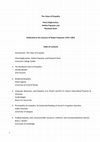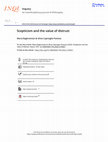Books by Maria Baghramian

Taylor and Francis, 2022
The role of experts and their expertise, in our personal and social lives, has taken centre stage... more The role of experts and their expertise, in our personal and social lives, has taken centre stage in the debates about our post-COVID-19 world. Scientific disinformation is rife, and expertise is badly needed to tackle highly complex social problems.
This book brings together philosophers, sociologists and policy experts to discuss the nature, scope and limitations of expert advice in policy decisions. The chapters collected here address some of the most fundamental questions in the debate on the role of experts. They explore, among others, the definitions of expertise, the role of experts in modern democracies, the dilemma of choosing between equally competent and qualified experts who cannot agree, the objectivity of expert judgements, the relationship between experts and novices in polarised social settings and the conditions on the trustworthiness of experts. These explorations, by some of the best- known academics working in the field, highlight the complexities of the questions they address but also lay down a road map for addressing them.
This is the prepublication version of my edited book Donald Davidson: Life and Words. It contains... more This is the prepublication version of my edited book Donald Davidson: Life and Words. It contains brief recollections of Davidson by 16 of his friends, colleagues, students and family members.
Relativism (Routledge): Table of Contents and Introduction, 2019
Relativism, 2019
Here is the ToC and Intro of my forthcoming book (with Maria Baghramian) on Relativism (Routledge... more Here is the ToC and Intro of my forthcoming book (with Maria Baghramian) on Relativism (Routledge 2019).
Papers by Maria Baghramian
Routledge eBooks, May 7, 2013
Annual Review of Environment and Resources, 2022
This review examines the alleged crisis of trust in environmental science and its impact on publi... more This review examines the alleged crisis of trust in environmental science and its impact on public opinion, policy decisions in the context of democratic governance, and the interaction between science and society. In an interdisciplinary manner, the review focuses on the following themes: the trustworthiness of environmental science, empirical studies on levels of trust and trust formation; social media, environmental science, and disinformation; trust in environmental governance and democracy; and co-production of knowledge and the production of trust in knowledge. The review explores both the normative issue of trustworthiness and empirical studies on how to build trust. The review does not provide any simple answers to whether trust in science is generally in decline or whether we are returning to a less
Relativism, 2019
This is the second chapter of our book on Relativism. It is a short history of how relativism has... more This is the second chapter of our book on Relativism. It is a short history of how relativism has been variously proposed since Protagoras, up to present days.

Routledge, 2020
The Value of Empathy explores various approaches to understanding empathy and investigates its mo... more The Value of Empathy explores various approaches to understanding empathy and investigates its moral and practical role.
The central role of empathy in understanding others, and the need for it in our social and inter-personal encounters, is widely acknowledged by philosophers, social scientists and psychologists alike. Discussions of empathy abound, not only in more specialised academic publications, but also in traditional and social media. Yet neither a clear understanding, nor a uniform definition of this relatively new term is available. Indeed, one difficulty in discussing empathy, in philosophy and beyond, is the profusion of definitions; the difficulty is compounded by a lack of clarity in the distinction between empathy and cognate concepts such as sympathy and compassion.
This book has two aims: Chapters 1-5 seeks to address the dual concerns of the lack of clarity and profusion of interpretations by suggesting new ways of approaching the topic. The second aim of the book is to connect the more abstract discussions of empathy with its normative functions. Chapters 6 -8 engage with the theoretical concerns relevant to the ethics of empathy and raise interesting points about its significance in ethical thought and action. The final four chapters focus on the practical normative significance of empathy by examining the connections between empathy, vulnerability and care in circumstances of ill health.
International Journal of Philosophical Studies, 2022
This introduction provides brief outlines of the articles collected in this special issue of the ... more This introduction provides brief outlines of the articles collected in this special issue of the International Journal of Philosophical Studies on the topic of Ethics and Emotions. It also announces the winners of the 2021 Robert Papazian and PERITIA prizes.

Inquiry, 2022
Faced with current urgent calls for more trust in experts, especially in high impact and politica... more Faced with current urgent calls for more trust in experts, especially in high impact and politically sensitive domains, such as climate science and COVID-19, the complex and problematic nature of public trust in experts and the need for a more critical approach to the topic are easy to overlook. Scepticism – at least in its Humean mitigated form that encourages independent, questioning attitudes – can prove valuable to democratic governance, but stands in opposition to the cognitive dependency entailed by epistemic trust. In this paper, we investigate the tension between the value of mitigated scepticism – understood as the exercise of reason-based doubt in a particular domain – and the need for trust in experts. We offer four arguments in favour of mitigated scepticism: the argument from loss of intellectual autonomy; the argument from democratic deficit; the argument from the normative failures of science; and the argument from past and current injustices. These arguments highlight the tension between the requirements for trust and justified scepticism about the role of experts. One solution, which we reject, is the idea that reliance, rather than trust, is sufficient for the purposes of accommodating experts in policy matters. The solution we endorse is to create a ‘climate of trust’, where questioning experts and expertise is welcomed, but the epistemic trust necessary for action upon information which the public cannot obtain first-hand is enabled and encouraged through structural, institutional, and justice-based measures.
The most up to date reference book on the topic of relativism in philosoph
Artosi, A., Baghramian, M., Barberis, M., Bianchi, C., Coliva, A., Dell'Utri, M., et al. (20... more Artosi, A., Baghramian, M., Barberis, M., Bianchi, C., Coliva, A., Dell'Utri, M., et al. (2010). Il Relativismo: temi e prospettive (PG Maniaci Giorgio, a cura di). Roma : Aracne. ... Artosi, A; Baghramian, M; Barberis, M; Bianchi, C; Coliva, A; Dell'Utri, M; Frega, R; Lecaldano, E; O' ...

Uploads
Books by Maria Baghramian
This book brings together philosophers, sociologists and policy experts to discuss the nature, scope and limitations of expert advice in policy decisions. The chapters collected here address some of the most fundamental questions in the debate on the role of experts. They explore, among others, the definitions of expertise, the role of experts in modern democracies, the dilemma of choosing between equally competent and qualified experts who cannot agree, the objectivity of expert judgements, the relationship between experts and novices in polarised social settings and the conditions on the trustworthiness of experts. These explorations, by some of the best- known academics working in the field, highlight the complexities of the questions they address but also lay down a road map for addressing them.
Papers by Maria Baghramian
The central role of empathy in understanding others, and the need for it in our social and inter-personal encounters, is widely acknowledged by philosophers, social scientists and psychologists alike. Discussions of empathy abound, not only in more specialised academic publications, but also in traditional and social media. Yet neither a clear understanding, nor a uniform definition of this relatively new term is available. Indeed, one difficulty in discussing empathy, in philosophy and beyond, is the profusion of definitions; the difficulty is compounded by a lack of clarity in the distinction between empathy and cognate concepts such as sympathy and compassion.
This book has two aims: Chapters 1-5 seeks to address the dual concerns of the lack of clarity and profusion of interpretations by suggesting new ways of approaching the topic. The second aim of the book is to connect the more abstract discussions of empathy with its normative functions. Chapters 6 -8 engage with the theoretical concerns relevant to the ethics of empathy and raise interesting points about its significance in ethical thought and action. The final four chapters focus on the practical normative significance of empathy by examining the connections between empathy, vulnerability and care in circumstances of ill health.
This book brings together philosophers, sociologists and policy experts to discuss the nature, scope and limitations of expert advice in policy decisions. The chapters collected here address some of the most fundamental questions in the debate on the role of experts. They explore, among others, the definitions of expertise, the role of experts in modern democracies, the dilemma of choosing between equally competent and qualified experts who cannot agree, the objectivity of expert judgements, the relationship between experts and novices in polarised social settings and the conditions on the trustworthiness of experts. These explorations, by some of the best- known academics working in the field, highlight the complexities of the questions they address but also lay down a road map for addressing them.
The central role of empathy in understanding others, and the need for it in our social and inter-personal encounters, is widely acknowledged by philosophers, social scientists and psychologists alike. Discussions of empathy abound, not only in more specialised academic publications, but also in traditional and social media. Yet neither a clear understanding, nor a uniform definition of this relatively new term is available. Indeed, one difficulty in discussing empathy, in philosophy and beyond, is the profusion of definitions; the difficulty is compounded by a lack of clarity in the distinction between empathy and cognate concepts such as sympathy and compassion.
This book has two aims: Chapters 1-5 seeks to address the dual concerns of the lack of clarity and profusion of interpretations by suggesting new ways of approaching the topic. The second aim of the book is to connect the more abstract discussions of empathy with its normative functions. Chapters 6 -8 engage with the theoretical concerns relevant to the ethics of empathy and raise interesting points about its significance in ethical thought and action. The final four chapters focus on the practical normative significance of empathy by examining the connections between empathy, vulnerability and care in circumstances of ill health.
The vacancy arises from the Irish Research Council New Horizons research award to Professor Maria Baghramian PI and Professor Luke Drury (co-PI) for an interdisciplinary project on the epistemology of peer disagreement in the natural sciences. The project will be appointing a Post-Doctoral Research Fellow specialising in philosophy of science and/or the epistemology of peer disagreement. The period of employment is March 2016 – September 2017. The postdoctoral Fellow will engage in research and publication relevant to the epistemology of peer expert disagreement, with a particular focus on peer disagreement among scientists. They will act as a disciplinary liaison between the Philosophy and the Science PIs. They will engage in the organisation of workshops and conferences as specified by the project PIs and will act as a co-editor of the conference and workshop proceedings.
This post may be appointed at either UCD Post Doctoral Research Fellow Level 1 or Level 2, depending on the qualifications & experience of the successful candidate.
Salary: €31,270 per annum
Closing date: 15th January 2016, 5 pm